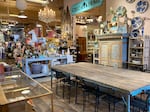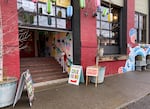
Emily Riley, owner of RX Letterpress, works at her studio inside Cargo Inc. in Southeast Portland on March 20, 2025. Riley moved into Cargo a couple years before the pandemic and helped recruit other local vendors to the spot as COVID-19 presented new challenges for independent retailers.
Kyra Buckley / OPB
In March 2020, a massive shipping container packed with thoughtfully curated furniture, art and clothing from places like India, Vietnam and the Philippines was on a ship somewhere in the ocean, ultimately headed to a warehouse-size retail store in southeast Portland called Cargo Inc.
Then, the world seemingly shut down overnight as the COVID-19 pandemic took root. Massive cargo ships could no longer safely dock and unload, and international commerce came to a near standstill.
In Oregon, and across the U.S., businesses — especially brick and mortar retailers — were forced to rapidly change the way they bought and sold goods. At least 40% of Oregon businesses temporarily closed during 2020, according to a survey of 5,000 companies by Business Oregon, Travel Oregon and the Oregon Small Business Development Center Network.
Cargo Inc. co-owner Bridgid Blackburn said it took months for that shipping container’s contents to finally make it to her sales floor at Southeast Yamhill and Water Street. By that point, Blackburn and Patty Merrill, Cargo co-owner and founder, were already changing the way they did business.
“The shipping costs went up so much,” in 2020, Blackburn said. “Where a container might’ve been $5,000 or $6,000, it was three times to four times that. We were quoted, at one point, $20,000 for a container.”
Challenges getting inventory paired with closing sales floors due to the pandemic led to strained resources and dwindling finances for independent retailers. Federal data shows retail sales plummeted in Oregon during the first few months of the pandemic. Throughout 2020, at least 20 businesses in downtown Portland closed permanently, according to surveys conducted by the city.
Blackburn knew the store needed to shift to survive the uncertainty of the pandemic, but there was no guide to follow. So, after the initial shock of the COVID closure, the company began inviting Portland artists and retailers into Cargo’s building.
Five years later, Cargo has more than 40 vendors represented at it store. It operates almost like a consignment shop, almost like a collective, almost like a business incubator, and almost like a public market — but it’s not exactly any of those things. Blackburn calls it an emporium.

Bridgid Blackburn, co-owner of Cargo in Southeast Portland, poses in the store on March 20, 2025. In 2020, Blackburn knew the store needed to shift from mainly selling imported goods to a new model in order to survive the uncertainty of the pandemic. After the initial shock of the COVID closure, the company began inviting Portland artists and retailers into Cargo’s building.
Kyra Buckley / OPB
Moving to an emporium model
Vendors are able to staff space and manage sales, or let Cargo staff help manage the space and the sales, or sell items mingled in with other Cargo goods like at a consignment shop.
Cargo Emporium, which the company calls this part of its business now, continues to house and launch vendor-owned businesses, five years after it was forced by the pandemic to stop selling import items as its main focus. The business model shift has strengthened Cargo’s finances while still maintaining the store owners’ values, Blackburn said, which is to offer well-made goods that are built to last and have a story behind them.
The model allows shoppers to browse a mix of locally crafted goods and art alongside an eclectic collection of clothes, decor and art — and gives those shoppers the ability to interact with multiple local vendors under one roof. Meanwhile, vendors get exposure to shoppers at a well-established retail spot.

Part of the main sales floor plus a gathering space at Cargo Inc. in Southeast Portland on March 20, 2025. Cargo co-owner Bridgid Blackburn said more than 40 vendors are represented at the store. When the pandemic hit the business shifted from being mainly an import shop to an emporium offering locally crafted goods mixed with eclectic curated items.
Kyra Buckley / OPB
However, Blackburn said the pivot wasn’t immediate.
Before the pandemic, Cargo already housed two other local vendors that rented space in the warehouse: RX Letterpress with studio and retail space in the basement, and TASI Jewelry on the main sales floor.
At the onset of COVID, the store closed to the public for months, before it opening up to limited shoppers. For most of 2020, Cargo didn’t add any vendors – and, like many companies in Oregon and around the globe, it didn’t turn a profit that year.
But in 2021 it expanded its emporium model and offered more space to vendors. Some opted to rent studio space along with retail displays in the warehouse-sized building, which Cargo partially owns and where the company controls two floors. Other vendors simply rented shelf space or a nook within the store.
“The thing that we had that was a great benefit – that was kind of dumb luck – was this large amount of space that we weren’t actually able to physically fill with inventory, even if we had the business,” Blackburn said. “But what we could do was fill it with community.”

The main entrance of Cargo Inc. in Southeast Portland on March 20, 2025. Cargo co-owner Bridgid Blackburn said more than 40 vendors are represented at the store. When the pandemic hit the business shifted from being mainly an import shop to an emporium offering locally crafted goods mixed with eclectic curated items.
Kyra Buckley / OPB
It started before the pandemic
RX Letterpress owner Emily Riley moved her one-woman company into Cargo’s basement a few years before COVID hit.
“I personally had been terrified at the beginning of the pandemic,” Riley said, “because I had committed to a bunch of craft shows and I knew those were no longer going to be happening.”
Turns out, she had nothing to worry about. Riley’s line of sassy greeting cards, which pair vintage images with witty sayings, blew up in terms of online sales. On top of that, Cargo was able to keep offering Riley a place to create her inventory.
When Blackburn told her they were opening Cargo up to more retailers, Riley started recruiting vendors.
“We ended up welcoming in all these other businesses and growing the Cargo Emporium a little bit by accident,” she said, “And a lot by word of mouth.”
Recently Riley moved RX Letterpress from the basement up to the northeast corner of the main sales floor at Cargo. Shoppers can watch Riley work away at a large letterpress printing machine while they peruse displays of magnets, stickers, coffee mugs and more.
In the last couple of years Riley’s also expanded her online offerings beyond Etsy to other websites. It all added up to 2024 being her best sales year ever, she said.

Postcard Bookshop inside Cargo on March 20,2025. Guidebooks, literature, biographies, and cookbooks are shelved by country at the travel-themed bookstore.
Kyra Buckley / OPB
Vendors opt in to the model
Across the sales floor from RX Letterpress is one of Cargo’s newest retailers: Postcard Bookshop.
“As someone who’s starting out a business from scratch and hasn’t been building up through popups, hasn’t been building up a social media following, doesn’t have an expansion from an existing storefront — I don’t think I can find something else that gives me a runway to begin with an idea the way that Cargo has,” said Patrick Leonard, who opened Postcard Bookshop last October.
In his travel-themed bookstore, Leonard shelves guidebooks, literature, biographies and cookbooks – arranged by country. He considered opening a small independent brick-and-mortar shop, but was encouraged by another Cargo vendor to explore the emporium.
“Starting a business where I am the only employee, I have come to realize how lonely that would’ve been if I was out in a storefront on my own,” Leonard said. “I think there would be days where I watched people walk past the window every day, and I don’t have that experience here within Cargo. There’s always someone in the store.”

Patrick Leonard, owner of Postcard Bookshop inside Cargo, poses at his bookstore on March 20, 2024 in Portland, Ore. Leonard is one of the newest vendors at Cargo, which shifted during from being mainly an import shop to an emporium selling goods from more than 40 vendors.
Kyra Buckley / OPB
Leonard said he hopes in the future his shop can host book clubs and other community events centered around love of travel and literature.
“The fortunate thing for me is that those kinds of things are possible here within Cargo,” he said.
Challenges always lie ahead
Sitting in a freight elevator that doubles as an art gallery, just off Cargo’s sales floor, Blackburn expresses relief that the store pivoted during the pandemic five years ago.
That change helped Cargo maintain financial health and build a safety net. Plus, Cargo now acts as a physical space for more than 40 vendors to share resources and expertise.
Blackburn said that existing network of smart and innovative vendors is helpful for new retailers coming into Cargo — and for seasoned business owners like her. After all, she’s learning how to operate a somewhat new retail model as she goes.
“My profit margins are different,” she said. “The amount of inventory I sell as Cargo is different. And then just making sure you’re paying attention to all of those micro adjustments, and are recouping your labor in those sort of hidden spots — and that’s a full-time active animal that we have to watch and learn from at the same time. I don’t have a guidebook on it.”
And yet, Blackburn points out the store’s shift throughout the pandemic didn’t change Cargo’s values — even though instead of finding furniture, art and clothing from around the globe, Cargo is curating from the immediate community.
“We have moved to explore those same qualities that we always looked for traveling — handmade for particular use, made to last, with a story — so that now we’re looking to do that more locally,” Blackburn said.
